The Bell website blocking coalition responded to thousands of interventions on its proposal this week, reiterating many of the same claims it has been making since it launched the request with the CRTC. While the commission should provide details on what comes next shortly, according to internal commission documents released under the Access to Information Act, the high profile public consultation only came after months of private discussions between Bell and CRTC officials on the site blocking plan.
The internal documents, obtained and posted by the Forum for Research and Policy in Communications, indicates that the groundwork for the site blocking proposal was laid in the summer of 2017, well before public filings or press reports. As far back as July 2017, Bell executives pressed CRTC commissioner Christopher MacDonald for a meeting with all CRTC commissioners and senior staff to make its case for a commission-backed site blocking system.
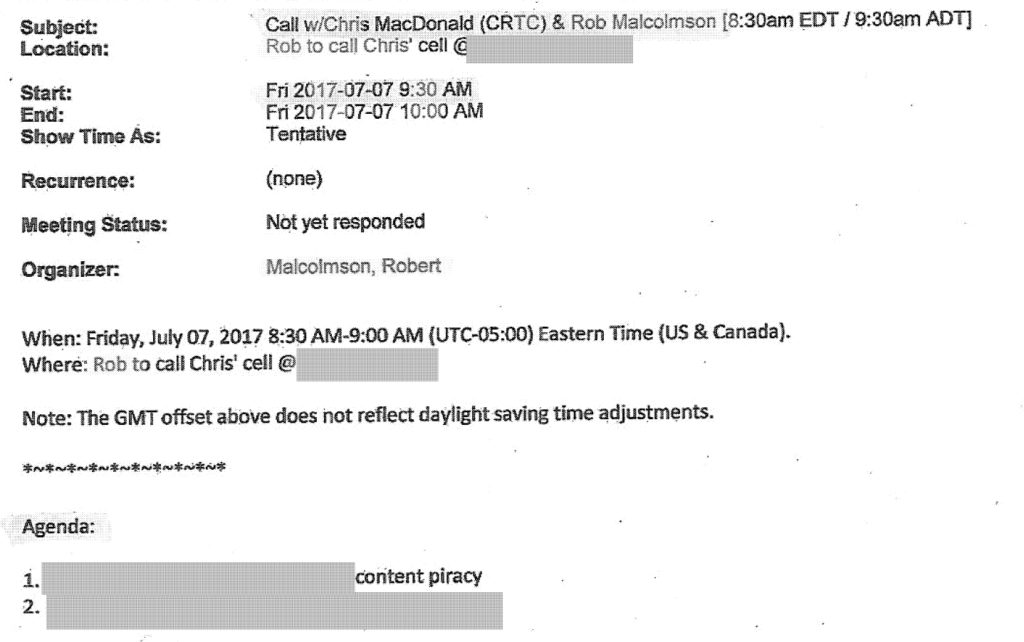
Bell call to CRTC commissioner, obtained under ATIP
McDonald followed up on the call by suggesting that Bell be given the chance to present its proposal to the full commission without a public filing.
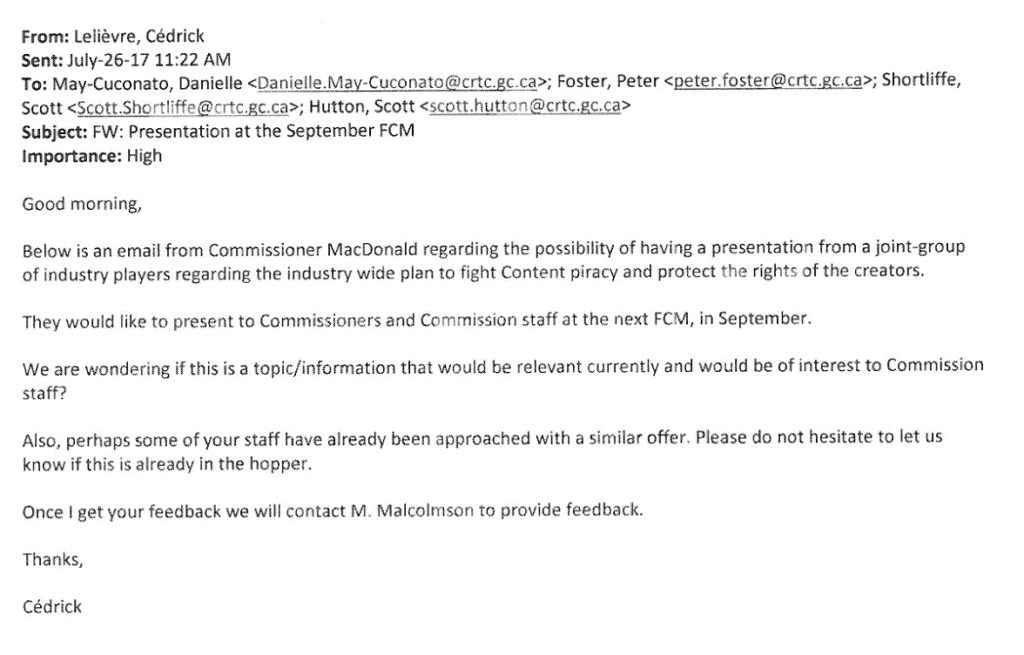
CRTC email re: Bell presentation proposal, obtained under ATIP
The request ultimately led to a presentation dated September 21, 2017 that provided a detailed preview of the filing, complete with policy and legal arguments supporting the proposal. Bell raised the same issue before a House of Commons committee the day before, recommending that site blocking be added to the North America Free Trade Agreement.
The presentation, titled Anti-Piracy Coalition: Site Blocking Proposal, featured only the Bell corporate logo and made no references to other coalition members. Over several slides, it argued for site blocking and an anti-piracy agency, claiming the proposal is consistent with other countries and fits within the CRTC’s mandate. The final submission months later employed the same arguments and data.
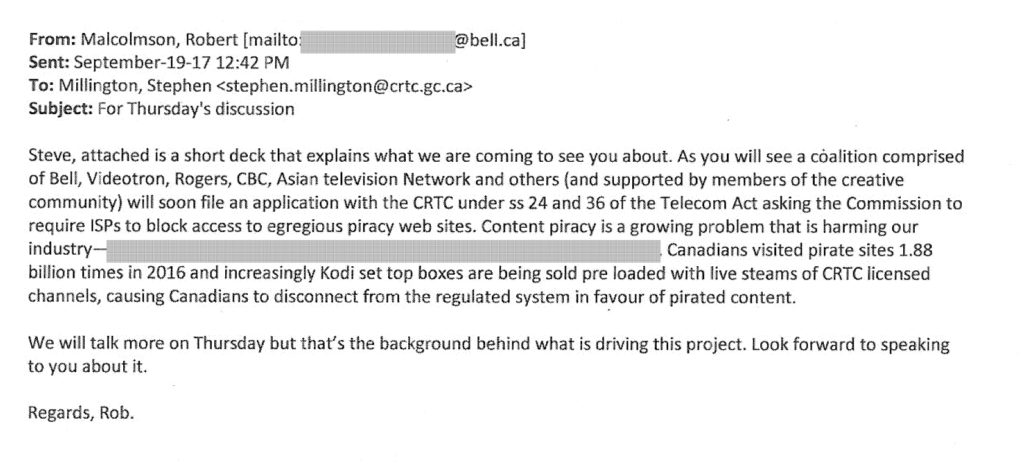
Bell sends blocking PPT, obtained under ATIP
The Bell presentation appears to have sparked further action within the commission, including the crafting an internal legal opinion on piracy website blocking. Stephen Millington, the CRTC’s Acting Senior General Counsel, requested a copy of the opinion one day after reports of the site blocking plan leaked in Canadaland in December 2017.
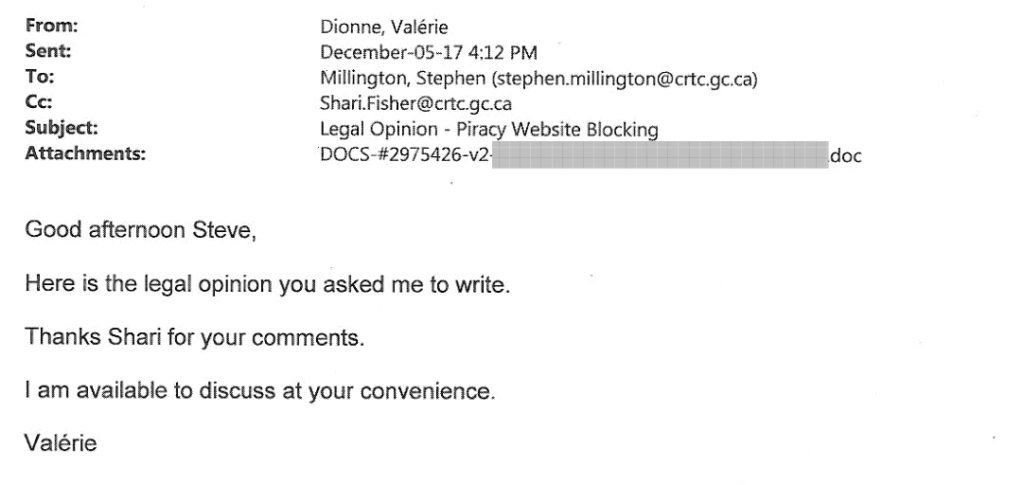
CRTC legal opinion, obtained under ATIP
Moreover, on the day of the formal filing, Bell provided a separate copy to senior commission officials with the email indicating the additional copy was “as requested”.

Bell filing email, obtained under ATIP
The meetings raise serious fairness concerns regarding the regulatory process on website blocking. By granting Bell a private audience with CRTC officials, the company was able present its case without counter-arguments or a public airing. In fact, without a transcript of the meeting, there will be questions about whether the ultimate CRTC decision may have been influenced by evidence presented outside the formal hearing process.
Moreover, the private meetings clearly had their intended effect with commission officials developing internal positions and analysis without a formal filing or the benefit of the dozens of detailed submissions that carefully examined the legal implications of site blocking for freedom of expression, net neutrality, due process, and the CRTC’s jurisdiction.
The concerns are exacerbated by the fact that it appears the meetings were not disclosed in the lobbyist registry. The registry references five meeting between Bell and CRTC officials between October 2017 and February 2018, but there are no reports of a September meeting nor of earlier communications.
The five meetings over a five month period is notable since it points to a significant increase in the number of meetings between the Commission and Bell since CRTC Chair Ian Scott took over in September 2017. Bell did not report any CRTC meetings in all of 2016 and the first half of 2017.
There are benefits to active discussions between the CRTC and all stakeholders. However, granting Bell a private audience for its website blocking proposal months before launching a public process ultimately feeds fears of industry capture of Canada’s telecom regulator and calls into question the fairness of a proposal ironically branded “fairplay”.
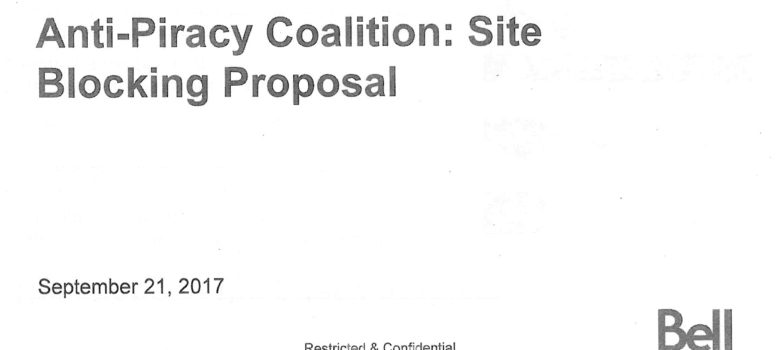







Whatever doubts may have lingered in anyone’s mind about Bell Canada’s lack of integrity and transparency are destroyed by the revelations contained in the emails and documents, and in Prof. Geist’s column. Based on this information alone, Bell should be barred from making any submissions to the CRTC for some period of time – perhaps one year would be suitable punishment.
At the same time, it is unthinkable that a public body such as the CRTC would agree to secret meetings to discuss a controversial policy with a stakeholder that proposed the policy in the first place. In Britain, this would prompt calls for resignations and I am not sure why the same does not happen in Canada.
Did Bell violate the regulations around the reporting of lobbying activity? How can we report them?
Presumably to the Commissioner of Lobbying – https://lobbycanada.gc.ca/eic/site/012.nsf/eng/h_00000.html
Horrible. CRTC needs to fire those responsible/complicit, and Bell needs to suck it up and try to actually compete with US content, not go crying to the CRTC every time Canadians get more entertainment options that don’t involve watching Big Bang Theory reruns on CTV.
Has there been any consultation or reports on related issues, e.g., including anti-competitive aspects of blocking proposal, and fair access provisions arising from WTO and bilateral trade agreements?
Who is the CRTC accountable to? The CRTC needs to be called on this type of behavior which is totally unacceptable given their mandate. No wonder people don’t trust the CRTC to do what is right for the Canadian people – this only adds fuel the fire of distrust.
The CRTC is an independent authority that reports to Parliament through the Minister of Canadian Heritage.
Is that a breach of the lobbying act and/or lobbyist code of conduct?
It’s time Bell Canada is broken up .
Pingback: Bell niega privada revisión de FairPlay la lista negra de la piratería de aplicaciones con CRTC – High Tech Newz
Pingback: Judge For Yourself: Bell Says It Didn't Meet CRTC to Review the FairPlay Application, But Here's the Slide Presentation - Michael Geist
Pingback: Yes, I’m still alive | Angelus Novus
Pingback: Fairplay Canada Faces Accusations of CRTC Backroom Dealing
Pingback: CRTC Truthiness: New Docs Reveal New Story About Bell Meetings with the Commission on Website Blocking - Michael Geist
Pingback: "This Really Isn't Our Fight and It Will Cost Us": Behind the Scenes of CBC Support for Bell's Website Blocking Plan - Michael Geist